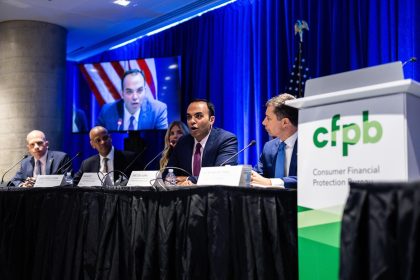As he looks towards a possible 2025 IPO, CEO Chris Britt opens up about his own history and Chime’s current business and future. Could Washington stomp on his plans?
By Jeff Kauflin, Forbes Staff
F
or decades, it’s been a riddle in banking: how do you build a sustainable and profitable business serving low and middle-income consumers? Sixteen years ago, Chris Britt, then chief product officer at Green Dot, believed he’d discovered the answer—direct deposit of paychecks. Green Dot was selling prepaid debit cards to cash-strapped Americans without traditional bank accounts, and Britt saw that customers who had their paychecks automatically deposited into their Green Dot accounts used the card to pay virtually all their expenses. With each debit card swipe, Green Dot pocketed part of the interchange fees–the 1% to 2% charge merchants pay to accept debit and credit cards.
“The people on direct deposit were clearly the whales of the business,” says Britt, 51, the cofounder and CEO of Chime, the nation’s largest digital-only bank with $1.5 billion in annualized revenue and seven million customers using its cards for $8 billion a month in transactions.
It’s taken Chime 12 up-and-down years to get to this point, and it’s still not consistently profitable. But through it all, Britt has stayed true to his mission of serving the less affluent. Now, with an initial public offering in his sights possibly as early as next year, Britt, his executive team and some of his investors have opened up to Forbes, providing new details about the business, its history (including missteps) and its future plans. Until now, Chime hadn’t even disclosed its seven million customer count.
Britt is sitting in his spacious corner office in a 48-story-building in San Francisco’s ailing financial district, with Chime’s name plastered in big green letters in three different spots on the building’s exterior. It signed the office lease in September 2021, taking a 192,000-square-foot complex spanning six floors. The space is flush with plants, five fancy snack bars, a free cafeteria with an ample menu and an expansive roof deck with sweeping views. On this spring break day, in the world of hybrid work, the offices have an empty feel; about three-fourths of Chime’s local employees typically come into the office on Tuesdays and Wednesdays, the company says.
The building tells the tale of Chime’s heady expansion at the height of the pandemic-driven fintech boom, its strategic retreat (it laid off 12% of workers in 2022 and still hasn’t opened one of its six floors) and the more sustainable growth path it seems to be on now. In August 2021, Chime raised $750 million at a $25 billion valuation, bringing its total funds raised to $2.3 billion. Today, we estimate it’s worth around $8 billion based on valuation multiples of comparable fintech companies. We also estimate that Britt and cofounder Ryan King, who heads the tech side, own roughly 5% of the company each. That means they were briefly—on paper—billionaires and are now worth about $400 million apiece.
In 2023, Chime’s revenue grew an impressive 30% to about $1.3 billion, more than $1 billion of which was gross profit. But it spent about $270 million on marketing, according to media measurement firm Vivvix, and once you account for those and other costs, ranging from R&D to fraud losses, it lost roughly $200 million, according to a person familiar with its finances. Chime says it was profitable in the first quarter of 2024. Crucially, it still has $900 million of cash to fund its short-term ambitions.
Chime is indisputably the top player among digital-only “banks”—it doesn’t actually have a bank charter, but partners with Bancorp Bank and Stride Bank to offer banking products like checking and savings accounts. Yet when lumped in with real banks, Chime’s market share is only in the low single digits; Chase, for example, had 54 million active mobile customers at the end of last year.
So far, Chime has attracted largely young Americans earning between $35,000 and $65,000 a year to its free checking accounts and debit cards. (It won’t give you a traditional checkbook, but you can send paper checks through its app.) It’s built a sticky business by requiring customers to set up direct deposit to get access to a growing list of features, including $200 worth of free overdraft protection and a secured credit card that helps build your credit score. Britt and King claim that, by relying on technology and having no physical branches, their cost to serve each customer is just one-third of a traditional bank’s.
Despite its cost advantage, Chime has some lurking vulnerabilities, including a regulatory crackdown on nonbanks (the Biden Administration and Treasury Secretary Janet Yellen have toyed with the idea) and moves by the big banks to encroach on its turf.
Moreover, to make itself attractive to public investors and consistently profitable, it needs to broaden its product line and to some degree, its customer base. Britt wants Chime to be the primary account for individuals with earnings up to $100,000, meaning more than 75% of American workers. That’s a tall order since almost all the potential customers with earnings between $65,000 and $100,000 already have checking accounts at traditional banks and will need a compelling reason to switch.
As for product expansion, today Chime is announcing its first real foray into lending, the most profitable part of consumer banking, and a crucial step to make it less dependent on interchange-based revenue. Customers will be able to take out a three- or six-month personal loan of up to $1,000 instantly. There’s no credit check required to apply and no late fees, though any missed payments will be reported to the credit bureaus. Each short-term loan has a fixed dollar amount of interest that works out to an annual percentage rate ranging from 6% to 36%. Chime expects the loans to become available over the next month or two pending regulatory approval.
At some point—he’s not committing to a date—Britt also plans to start offering retirement accounts and ETFs. Crypto? That helped Robinhood grow fast, and Block’s Cash App—a direct competitor in Britt’s view—lets customers buy, sell and transfer bitcoin. That’s not how Britt rolls. “I don’t think aggressively pushing crypto on people who have no other investments is responsible,” he says.
“This is not a move-fast-and-break-things team,’’ observes Kirsten Green, an early Chime investor and the founder and managing partner of Forerunner Ventures.
Britt comes by his focus on the less-than-affluent naturally–he was born and raised in Mount Vernon, a town of some 70,000 people just north of the Bronx in New York. “It’s a pretty tough, working-class, blue-collar town,” he says. His parents divorced when he was five and struggled financially—he says his mom had jobs like selling Electrolux vacuums door-to-door, while his dad “wasn’t always the most responsible financially” and had gigs ranging from cosmetics salesman to running a janitorial service. Britt’s mom, hustling to make ends meet, would send him to Manhattan by himself to audition for child-acting gigs, and he appeared in several TV commercials, including a 1977 Burger King ad. He also made money with a newspaper route, by shoveling snow, and by scooping ice cream at Baskin Robbins.
Britt’s fortunes improved when a neighbor, a retired Boy Scouts of America leader then in his late sixties, lent a hand. Joe Sonneborn, who died in 1998, watched Britt after school, paid part of his tuition that wasn’t covered by his scholarship at the upscale Rye Country Day and contributed tens of thousands to his tuition at Tulane University. (When Chime does go public, Britt says, it will commit 1% of its stock to scholarships for low-income kids.)
After graduating from Tulane in 1995, with a history major and economics minor, Britt became a management consultant at Accenture, then moved to ad tech startup Flycast, media analytics firm Comscore and Visa. In 2007, he joined Green Dot, one of the first companies to put prepaid debit cards on the racks at retail outlets like CVS and Walmart. He was chief product officer when it went public in 2010 at a $1.5 billion valuation and watched its stock price drop steeply over the next two years—today, Green Dot’s market cap is less than half a billion. The business, Britt concluded, had two major problems. First, it paid hefty fees to retailers to carry its cards and passed those costs on to consumers. Second, it had a low-brow brand image. “It was the product you get when you’re down on your luck,” Britt says. “You can’t move upmarket from there.”
In mid-2012, Britt saw his opening. The big banks were still struggling to rebuild their reputations and profits from the 2007 financial crisis, and Wells Fargo announced it would begin charging $7 a month to consumers who had previously enjoyed free checking—unless they kept a minimum daily balance or $1,500. Truth is, customers could also skirt the fees by setting up direct deposit of their paychecks, which was Britt’s holy grail. Yet the message conveyed in news stories about Wells Fargo’s move was unmistakable: the big banks didn’t want the sort of people Britt grew up with—the lower-middle-class Americans living paycheck to paycheck who couldn’t maintain a $1,500 balance.
That year he founded Chime with King, a now 47-year-old software engineer with a master’s from Stanford who had worked for a decade at Plaxo, the social networking site started by Napster cofounder Sean Parker. (It was later acquired by Comcast.)
Britt knew he wanted to target low and middle-income customers and convince them to set up direct deposit. “From the beginning, Chris and Ryan knew they didn’t want to go after tech founders in San Francisco or bankers in New York,” says Homebrew Ventures’ Satya Patel, who invested in Chime’s first $3 million funding round. “They were aiming for the heartland.”
Then, they misfired. Chime launched its debit card in April 2014 using shopping rewards and coupons as a hook. It raised $8 million in funding that November, telling investors it would have 150,000 card holders by the end of 2015. But research by Melissa Alvarado, a new analytics hire (she later became chief marketing officer), found that not only were new debit card holders not setting up direct deposit, they didn’t even think of it as a Chime feature. Her research-based conclusion: Basic, no-fee banking alone sparked people’s interest, and it would let Chime hit its customers over the head with a push for direct deposit.
Britt adopted the new approach, but it cost him over a year of valuable time. By the end of 2015, Chime had just 7,000 active users, not 150,000. Raising money again was grueling–Britt and King pitched nearly 100 venture firms. In 2016, they finally landed a “Series A extension” of $9 million led by Lauren Kolodny at Aspect Ventures, at a flat valuation of just $34 million. Fundraising the next year wasn’t much easier. Potential investors kept pointing to the fate of Simple, a well-respected digital bank founded in 2009 that had been acquired by BBVA for $117 million in 2014–a small exit that indicated unsustainable economics. Meanwhile, Clinkle, a buzzy fintech backed by Richard Branson, achieved little beyond burning investors’ cash.
Hans Morris, who leads NYCA Ventures, considered and passed on Chime in both 2016 and 2017. The problem, as he saw it: “You don’t have very much revenue because you don’t want to charge a lot of fees. And you have high customer acquisition costs, low spend among customers, not much loyalty and high churn.”
By mid-2017, Chime was down to six to nine months’ left of cash, and a big, publicly traded tech company informally offered to buy it for $60 to $70 million. Britt and King turned the offer down and eventually closed an $18 million round with San Francisco-based VC firm Cathay Innovation as a new lead investor.
Finally, the next year, Chime’s combination of features started to click with potential customers. The most innovative was access to direct-deposited paychecks two days early—something that the banks could have done, but never had an incentive to do, since it would cost them float. Chime also rolled out a savings account; the option to automatically move part of your paycheck into that savings account; free ATM withdrawals at a network of 38,000 ATMs; and no overdraft fees, the bane of those living paycheck to paycheck. Banks were then charging consumers more than $30 billion a year in overdraft fees, in part because of the way they processed transactions, bouncing multiple charges at $35 a pop. Chime would simply decline a debit card purchase rather than take an account below $0.
Word of mouth referrals began to surge, and customer acquisition costs dropped sharply. In 2019, Chime’s payment processor suffered an outage that left about 500,000 Chime customers without access to their money for several hours, but it also launched its SpotMe overdraft protection service, which allows a Chime customer to borrow up to $200 with no interest or late fees. Of course, to get that or other attractive features, you needed to set up direct deposit.
Chime’s interchange-based revenue model subsidizes such free features. Its interchange revenues are fattened by a provision of the Durbin Amendment, named after Senator Dick Durbin (D-Illinois) who pushed it through as part of the 2010 Dodd-Frank Act. That provision allows banks with less than $10 billion in assets (like Bancorp and Stride, the ones Chime partners with) to charge debit interchange fees that are substantially higher per transaction than what the big banks can. Moreover, as its customer counts and their transaction volume has grown, Chime has been able to negotiate a bigger share of the interchange fees that are split between banks, card issuers and the payment networks like Visa.
“Chris was able to build a brand that his customers are loyal to,” Morris–the VC who didn’t invest–says today. “It’s no different than Amex or other great brands that have customer loyalty, but you can’t name many financial services companies that have fair pricing and this type of loyalty among this demographic.”
Despite its growth, Chime has never been wholly embraced by Silicon Valley. When it raised that $750 million at a $25 billion valuation in 2021, venture capitalists who didn’t participate sniped privately that it was the most overvalued company in existence. “It’s amazing to me and sad how consistently underestimated this company has been,” says Chime investor and board member Kolodny.
Sure, it was overvalued—as were other fintechs that raised money during the boom times. But Chime insiders believe some of the skepticism stems from VCs’ ignorance of the realities of lower-income Americans’ finances. “We weren’t solving a problem that Silicon Valley investors were familiar with,” Alvarado says.
Britt, who’s often described as humble by peer CEOs and investors, also considers himself an outsider. He doesn’t tweet much, rarely appears on podcasts and attends few conferences. He didn’t go to Stanford or an Ivy League college. But he and his team understand their target customers well enough to keep coming up with features they value.
For example, in April 2020, during the early days of the Covid pandemic, Chime offered $200 in cash advances before people received their $1,200 per person stimulus checks. It eventually delivered $6.7 billion in stimulus payments up to five days early, helping people pay their bills and making a marketing splash. In the summer of 2020, it released a secured credit card with no late fees to boost users’ credit score. (Secured means a user puts funds in a separate Chime account, and that’s what they can charge on the credit card.) But growth wasn’t all word of mouth; as it raised huge rounds of funding, Chime spent extravagantly on advertising.
Meanwhile, its flood of new customers also brought a spike in bad actors and fraud. Chime says it ultimately ended up returning $650 million in fraudulently accessed Covid stimulus funds to U.S. state and federal agencies, including many cases where customers were claiming unemployment benefits in states they didn’t live in. It abruptly closed so many accounts to fight fraud that it closed legitimate users’ accounts too. Rental car companies like Avis stopped accepting Chime cards.
King says, in retrospect, that some of the fraud was committed not by crooks, but regular customers who fell on hard times or became opportunistic. “If you lose your job and your kid is hungry, people will do things that are not the type of thing they would normally do. It’s not quite as simple as there’s good people and bad people.”
Fraud has dogged other consumer-facing and fast-growing fintechs too—it’s a constant struggle to thwart the bad actors without inconveniencing good customers. Chime says its rate of closing accounts due to fraud is down more than 50% from 2021; complaints to the Consumer Financial Protection Bureau (CFPB) about wrongly closed Chime accounts appear to have peaked in the first half of 2023. Still, last November there was a spike in CFPB complaints around unauthorized transactions, and in January 2024, consumers filed 72 complaints about Chime accounts being opened without their permission–a sign that identity thieves are getting through Chime’s screens. With a new chief risk officer in place since November of 2022, Chime says it’s using all the tools, from machine learning models and third-party services to dedicated teams of analysts and investigators, to try to prevent fraud.
Meanwhile, Chime is working to reduce costs in other areas as it pushes for profitability. It cut 12% of its staff, or roughly 160 employees, in late 2022. It has also been bringing more of its payment processing in-house. King needs an army of people to do this–of Chime’s 1,300 employees, 600 are engineers, and more than 100 are focused on back-end payments operations.
Now Chime is trying to use generative AI to lower costs further. It uses a Google-powered chatbot to automate about 70% of its 1.5 million monthly customer inquiries. King says AI will eventually help Chime build new features, since you can “pipe every customer interaction into the AI so it understands everything about our seven million active members and what they need and what they’re complaining about.” Over the next year or two, Chime envisions consumer-facing AI features where a customer could ask the app questions like, “Am I spending too much this week?”
Inside a conference room in Chime’s San Francisco office in April, Britt and King are running a “Founders Welcome” meeting to greet new employees and describe the company’s grand ambitions. “If I think about who are the [fintech] companies that have the potential to be number one in primary-account market share in the next 5 to 10 years, there’s really only two in my mind. It’s Chime and Cash App,” King says. At the end of last year, Cash App, a money-transfer app with bank-like ambitions that is owned by Block (formerly Square), had 56 million total monthly active users. Of those, 23 million had a Cash App debit card, but just two million had set up direct deposit. By contrast, Chime says that most of its seven million active users have set up direct deposit.
Britt and King can’t resist taking jabs at their formidable competitor. “Most fintech companies who are supposed to be the hero trying to disrupt the big banks generate the majority of their revenue from fees,” Britt says. King interjects, “Even Cash App–they charge 1.75% to take your money out.” Cash App, Venmo and PayPal charge fees of up to 1.75% for instant withdrawal; you can withdraw for free if you can wait one to three days. Chime doesn’t charge a fee for instant withdrawal.
In addition to the challenge of diversifying its revenue streams and competition from Cash App and smaller digital banks, Chime faces a couple of nagging structural risks that could upset Britt’s big plans.
One risk is that the big banks wake up and compete. In the same way Robinhood led traditional brokers to make stock trading free and robo-advisors prompted Vanguard and Schwab to offer automated asset allocation, Chime has nudged the banking industry to adopt more customer-friendly features. Get this: None other than Wells Fargo now lets its customers get their paycheck two days early. “Banks do not have the cost structure that allows them to serve this segment profitably,” Britt insists. “A typical bank has a cost to serve in a checking account business of over $400. Our cost to serve is a third of that. We have a radical cost structure advantage.”
The other threat comes from Washington. Congress could alter the provision that allows Chime to earn more revenue per debit swipe than big banks–few believe it was designed to help an operation like Chime. Or, under pressure from retailers, it could limit the interchange fees Chime lives off.
While neither move seems imminent in a divided Congress, regulators have already begun cracking down on some of the banks that partner with fintechs for compliance infractions. (Chime’s partners, Bancorp and Stride, haven’t publicly been in regulators’ crosshairs recently.) Meanwhile, Treasury Secretary Yellen and others in the Biden Administration have questioned why fintechs should get to act like banks–without really being regulated.
Britt isn’t oblivious. He’s been making more trips to D.C. to meet with lawmakers. “What if they said, well, the only company that can market a bank account to a consumer has to be a bank,” he worries. That could hobble Chime’s business–getting a banking license could cost Chime upwards of $100 million and comes with capital requirements.
But Britt suggests Chime’s early struggles have steeled it for any challenge. “It helped us in the long run. Chip on the shoulder, whatever,’’ he says. “We’re not going to be out-hustled.”
MORE FROM FORBES
Read the full article here

















